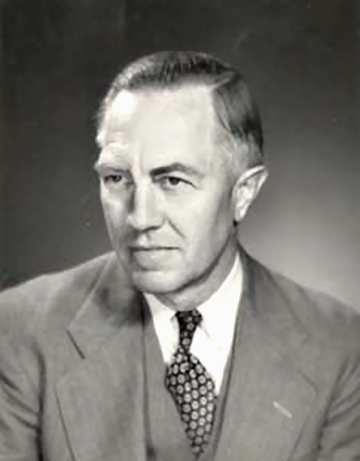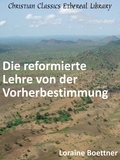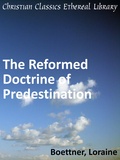Loraine Boettner
American theologian and author
Biography
Loraine was born March 7th 1901 in Linden Missouri. He lived with his family; his father being a Christian school superintendent and his mother a housewife. Loraine attended his father's church until he was 18. Then he joined his mother's church--the Centennial Methodist Church; his mother was of a different denominational background than his father.
In 1917 Lorraine decided to begin his college career. He took up studies in Agriculture at the University of Missouri. He later finished his degree after transferring a year later to Tarkio Presbyterian College. He graduated there cum laude with a B.S. degree. At Tarkio he was greatly influenced by professor J.B. Work, who was a staunch Calvinist. Although Work was of the Reformed position and influenced Loraine greatly, Loraine did not hold to the Reformed Doctrine of Predestination; this did not sit well with him. How ironic it is that later he wrote his Master's thesis on this subject.
In 1925 he furthered his education while attending Princeton. In 1928 he received his Th.B, and in 1929 his Th.M. While attending Princeton he found the flavor of Calvinistic doctrine to be sweet. While on summer break in his second year he devoured Hodge's Systematic Theology volumes two and three. After being so influenced by Hodge's teaching, the urge to write his Master's thesis on predestination became apparent. While attending Princeton he studied under Hodge's grandson, Casper W. Hodge. His influence strengthened Loraine in the Reformed doctrines. Loraine also met occasionally with another mentor/friend named Samuel G. Craig, editor of The Presbyterian. Craig and Boettner would meet for dinner to discuss the latest happenings at the college between the liberals and the Reformed influence of Machen.
After graduating from Princeton, Loraine began teaching at Pikesville Presbyterian College in Eastern Kentucky until 1937. While at this school he met his wife to be, Lillian Henry. They married in 1932. He also published Reformed Doctrine of Predestination in 1932; this was an exceptional year for him.
From 1935 to 1939 Loraine worked with Dr. Allis on a magazine called Christianity Today. This was not in any relation to the magazine of today. In 1937 he began working at the Library of Congress and the Bureau of Internal Revenue; he had left the teaching position at Pikesville. Though working in an environment which was not related to Biblical studies or Theology, he still continued to write producing many books at this stage of his life. Here he revised the Reformed Doctrine of Predestination from his original thesis word count being 8,000 words, to the revised count of 30,000 words.
While in New York City, he attended New York Avenue Presbyterian Church where Peter Marshall was Pastor. In 1948 he moved to Los Angeles because of his wife's failing health. His wife's two sisters came to aid in caring for her until she died in 1958. In that same year he returned to Rockport. In 1962, Loraine's book, recently written book, called Roman Catholicism surpassed his previous work The Reformed Doctrine of Predestination as best seller. This was a startling occurrence since he is best known for his work on the Reformed doctrines. The reason it surpassed his magnum opus was because it was more readable to the people and more a personal issue.
In 1989 Loraine contracted diabetes, leukemia, and cancer. His struggle was drawn out and by the end he had four blood transfusions which decreased his viability each time. At 8pm January 3, 1990 at Fairfax hospital Montana he died.
Certainly this Reformed theologian is studied because of his work The Reformed Doctrine of Predestination. His agility in rewriting the doctrines commonly held in a Reformed setting placed him among the current authorities on the subject. It is important to note that he did not introduce any new doctrine, but renewed the old. In this book he explained the traditional five points of Calvinism: total depravity, unconditional election, limited atonement, irresistible grace and perseverance of the saints. He molds into this the theological aspects of the plan and decrees of God; and also the relevant attributes of God. He very convincingly answers criticisms of Calvinism. He also adds a chapter on the history of Calvinism in order to explain the importance of what a theology does after one has embraced its doctrines. Loraine has also written other books such as Immortality” which explain the Christian concepts of death and dying in three specific areas: Physical death, Immortality and the intermediate state. Also, he has written: Studies in Theology, a compilation of articles and books written from 1939 onward. It is compiled in five sections 1) Inspiration of Scripture, 2) Christian Supernaturalism, 3) The Trinity, 4) The Person of Christ and 5) The Atonement. These are among his more popular and important works.


